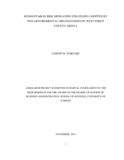| dc.description.abstract | This research project sought
to identify the risk mitigation strategies adopted by
humanitarian
NGO
’
s in West Pokot County. The objectives of this project were to
identify the
nature of risks encountered
by
NGO
’
s in West Pokot County and the risk
mitigation strategies adopted by these
NGO’s
.
The methodology of research
entailed
descriptive statistics involving
a population of 21
NGO
’
s in West Pokot County. The
instrument used i
n the study
was q
uestionnaires with closed
-
ended questions as well as
open ended
questions which was previously pilot
-
tested
to
establish content validity. The
questionnaire was sent out to the managers of these
NGO’s
in advance. Descriptive
statistics wer
e used to analyze the
cleaned
data.
The Study found that hazard risk was the
most important risk according to the responses from
NGO’s
. This was followed by
financial risk
as risks
affecting achievement of organizations goals
. On risk mit
igations;
r
isk av
oidance,
risk reduction
and risk retention
were the t
hree
most preferred risk
mitigation strategies employed by most
NGO’s
in their operations
.
In conclusion,
b
a
sed
on the findings, it is
recommended that
hazard risk
be looked into with a view to creating
an environment with less risk to raise
the effectiveness of employees, through initiatives
such as f
inancial incentives, appropriate insurance packages and additional security to
employees.
In order to secure funding,
it
was
evident that more non
t
raditiona
l funding
sources
and mechanisms
have to be explored in order to operate.
With respect to risk
mitigation strategies
, it
is recommended that
Integrated Risk Management Framework
needs to be in place to
provide a cohesive risk management process.
On the
part of
e
mployees
, they
need
to know their roles, responsibilities, and
their
accountab
ilities
so as
to reduce risk. The right team to manage projects is core in effective implementation of
projects.
This will not be complete without introducing or having
in place incentive
measures that will motivate the employee to monitor productivity and hence reduce risk
at organizational level.
The findings and conclusions together with recommendations of
this study will go a long way in building theory as well as kno
wledge base in this field,
and suggests areas for further research | en_US |

